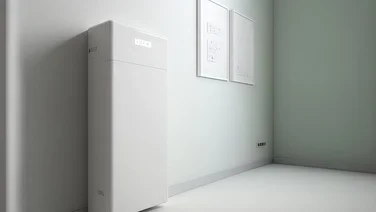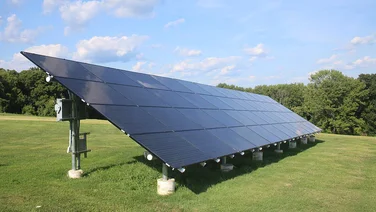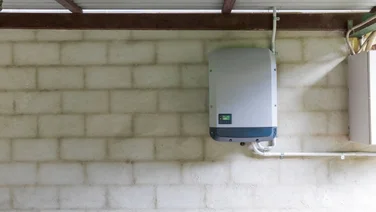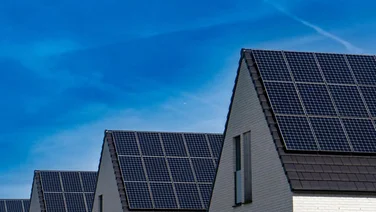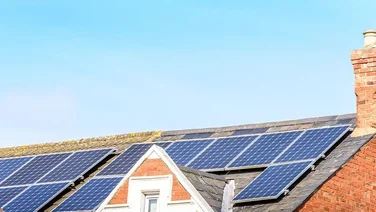✔ The solar industry supplies roughly 4.3 million jobs
✔ Replacing fossil fuels with solar could reduce the chance of getting lung cancer
✔ 4.3 million people are employed by the solar energy sector
The installed capacity of off-grid solar photovoltaics (PV) has grown more than tenfold globally between 2008 and 2018.
Moving forward, experts suggest that solar energy will be a key tool in our fight against climate change.
So what are the advantages of solar energy that make it so popular? We’ll go through them in detail in this article.
Where do you want to install solar panels?
Get started
What are the 7 advantages of solar energy?
Solar energy can benefit everyone, from homeowners to businesses. We’ve summarised its seven key advantages in the list below:
- It’s a clean energy source
- It’s an infinite resource
- It’s free
- It’s safe for local communities
- It’s quickly evolving
- It doesn’t cause noise pollution
- It provides green jobs
1. It’s a clean energy source
The biggest advantage of solar energy is that it’s a clean, green energy source that doesn’t produce any greenhouse gas emissions whilst operating.
Solar panels absorb sunlight and transform it into electricity – they literally sit there and sunbathe whilst the technology does the hard work in the background.
Fossil fuels, on the other hand, need to be burned to generate energy, which leads to toxic air pollution.
There are, however, some emissions created in the production of the panels themselves – but more on that later.
2. It’s infinite
The sun provides enough energy to power the world – and then some. In fact, 173,000 terawatts (TW) of solar energy strike the Earth at any given moment. In other words, the sun provides us with more than 10,000 times the world’s total energy use in that time.
Solar energy can also be harnessed anywhere in the world, from the sandy Sahara plains to drizzly UK fields.
This reliable source of energy will also be available until the sun dies, which shouldn’t happen for another 5 million years. This means there’s literally an unlimited amount of solar energy for us to use, without having to harm the planet.
The same cannot be said for fossil fuels. Although most of the world currently relies on them, there’s a finite amount left, since they take millions of years to form – and we’re quickly running out
3. It’s free
Utilising the sun’s energy is completely free. It’s already there, and isn’t going away for millions of years, so why not make the most of it?
But, like most good things in life, there’s a catch. To get this free energy, people need to spend thousands of pounds on the equipment – the exact amount will depend on the size of the solar panel system, the type of panels, and the supplier.
4. It’s safe for local communities
Solar panels don’t emit any harmful chemicals whilst operating, which is a refreshing change from what we’re used to with other fuels, like coal, oil, gas, and nuclear.
After centuries of powering the world with fossil fuels, air pollution has reached toxic levels in some parts of the world, leading to higher levels of lung-related illnesses.
For example, experts have found that people living close to an industrial complex have an increased risk of asthma, respiratory diseases, and hospitalisation for respiratory infection.
However, Noah Kittner, assistant professor at the Gillings School of Global Public Health, states that replacing fossil fuels with solar panels could actually reduce the chance of getting lung cancer.
Many governments are also pushing for nuclear energy as a low-carbon way of powering countries – but even this comes with its dangers.
Although it’s rare, an uncontrolled nuclear reaction could result in widespread contamination of air and water – we only need to look at Chernobyl to see how things can go tragically wrong with nuclear energy.
Plus, solar panels can increase the value of your home. 69% of Brits say they would be a property with solar panels on it, according to our National Home Energy Survey. That’s up from 65% in last year’s survey.
5. It’s quickly evolving
The solar energy industry is evolving at a rapid rate, which means we’re able to harness more solar energy than ever before.
For example, solar cell efficiency rating – the measurement of a panel’s ability to convert sunlight into usable electricity – has gone from 15% in the 1950s to 47% today.
As for the future? Innovations in quantum physics and nanotechnology are predicted to double – or even triple – the electrical output of solar power systems.
Some of the most exciting solar panel developments in recent years include:
- Perovskite solar panels – These are tandem solar cells (two solar cells stacked one on top of the other), which are created when a thin perovskite cell is placed on top of a standard silicon cell
- Quantum dot solar panels – Quantum dots can squeeze out more energy from each photon (a type of particle that carries energy from the sun), meaning these panels are able to increase the maximum conversion efficiency of solar panels to about 66%
- Zombie solar cells – This new type of solar cell can adapt to the amount of available light, meaning it will even be able to work indoors
You might also like: 13 Solar Panel Facts.
6. It doesn’t cause any noise pollution
If you’ve ever been near a coal mine, oil rig, or wind turbine, you’ll know how noisy it can be to harness energy.
This isn’t just annoying, but it can disrupt behavioural patterns in local wildlife. Noise pollution can even have negative impacts on some species’ reproduction rates.
Thankfully, harnessing solar energy is a silent process. This is because solar panels have no moving parts – they just stay put and absorb sunlight.
7. It provides green jobs
One of the major arguments against ditching fossil fuels is that millions of jobs will be lost. Whilst this is true, the solar energy industry will also generate a lot of new green jobs – for a better cause too.
As of 2020, there were 12.7 million people employed in the global renewable energy industry – up from 11.5 million in 2019.
The solar and wind sectors had the largest workforce out of all the renewable energy sectors, with roughly 4.3 million and 1.3 million jobs respectively.
There are plenty of different roles on offer in the solar energy sector, ranging from research and development to manufacturing and construction.
Renewable energy needs more investment from the UK government to generate these jobs though, which is something the UK public most definitely wants.
Where do you want to install solar panels?
Get started
Summary
It’s clear that solar energy has many advantages to it. And as the world continues to find cleaner ways to power our growing energy demands, solar energy is sure to be on the front line.
Want the really good news? You can benefit from solar energy at home. Installing a set of solar panels onto your property’s roof will mean you can reduce your energy bills whilst also doing your bit to help the planet.
Want to find the perfect set of solar panels for your home? Use our free comparison tool to speed up the process. All you have to do is answer a few simple questions about your property, and our suppliers will be in touch with free quotes for you to compare.
FAQs
Do solar panels work at night?
Unfortunately, solar panels don’t work during the night because they rely on sunlight to generate electricity.
To overcome this obstacle, make the most of your panels by investing in a solar battery. This way, you can store all the energy you don’t use throughout the day.
How reliable is solar energy?
Solar panels can be a very reliable source of energy, especially if it’s paired with battery storage.
Of course, there will be times when solar output is low, such as on very cloudy days, but any excess solar power generated on other sunny days will be stored in the battery and ready to go.
How long do solar panels last?
Solar panels last between 25 and 30 years, but they’ll still produce energy beyond this timeframe, just at a slightly lower rate.
To give you an idea, most solar panel warranties guarantee the panels will operate at 90% of their original capacity after 10 years, and 80% after 25 years.
What are the disadavantages of solar panels?
Although solar panels come with an array of benefits, they do have some disadvantages. Some of the common problems with solar panels include:
- Debris build-up – If dust, dirt, or debris is left on the surface of a solar panel, it’ll block some of the sunlight and will lower the panel’s output. Thankfully, if panels are installed at the correct angle, this shouldn’t happen frequently
- Low efficiency rating – Most domestic solar panels on the market have an efficiency rating of between 18-22%. However, it’s worth noting that researchers are constantly breaking barriers with efficiency, so we’re sure to see some improvements in this over time
- Difficult to recycle – It’s currently quite complicated and expensive to recycle solar panels properly. The techniques used to separate important elements, such as silicon and silver, currently cost more than the worth of the base materials.
- Appearance – Despite advancements in the appearance of solar panels, some people are still unhappy with the aesthetics. If you can relate to this, we’d recommend looking into either integrated solar panels or solar roof tiles


